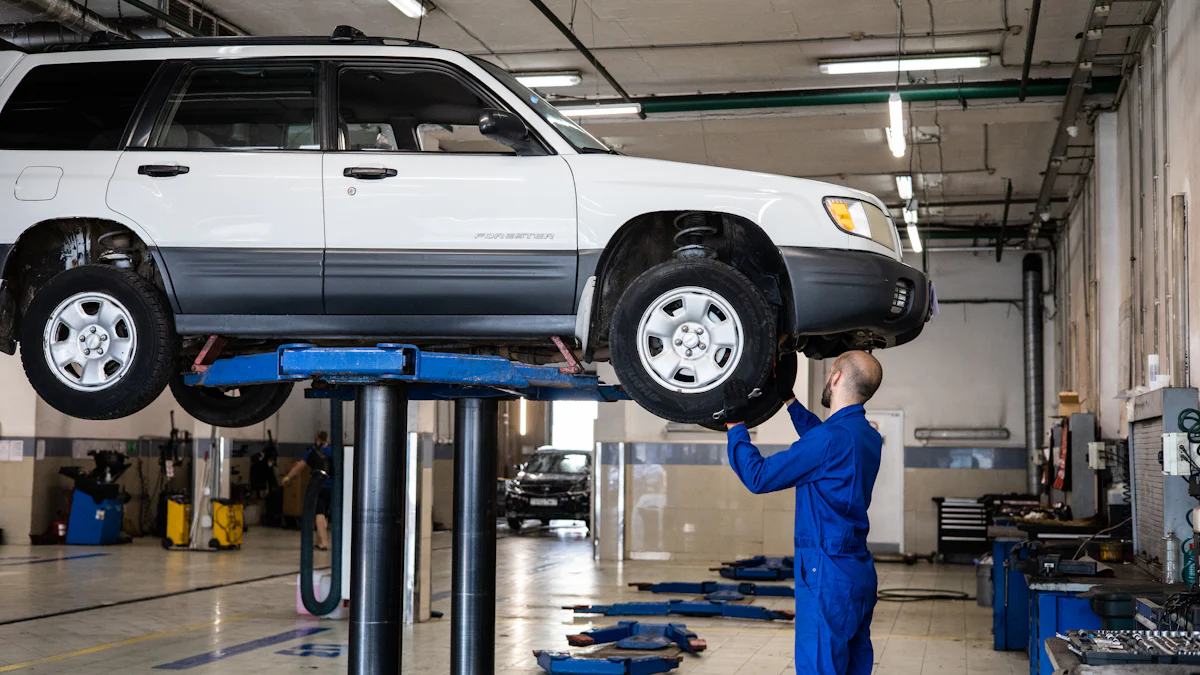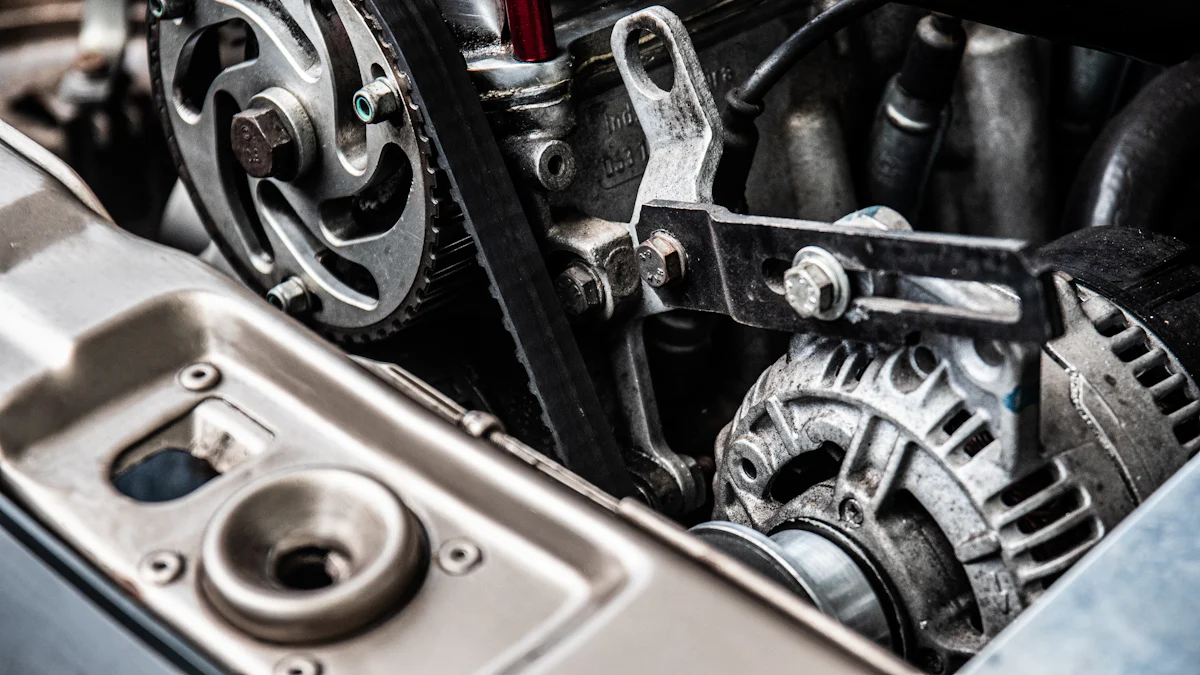Las piezas más sustituidas en los vehículos BMW

BMW vehicles deliver unmatched luxury and performance, but owning one comes with its challenges, especially when it comes to BMW car parts. You might notice that certain parts wear out faster than expected. For instance, BMW ranks 30th out of 32 car brands for maintenance costs, and drivers visit repair shops twice as often as the industry average. Common issues include electronic malfunctions, coolant system failures, and even suspension problems like uneven tire wear or excessive bouncing. Staying proactive with maintenance can save you from costly repairs and keep your BMW running smoothly.
Principales conclusiones
Regular maintenance is crucial for BMWs to avoid costly repairs and ensure optimal performance.
Pay attention to warning signs like squeaking brakes or uneven tire wear, as they indicate potential issues that need immediate attention.
Use high-quality, OEM parts for replacements to maintain your BMW’s performance and compatibility.
Stick to a maintenance schedule for oil changes and brake inspections to prolong the life of critical components.
Monitor your battery and electrical systems regularly to prevent frustrating breakdowns and ensure all features function smoothly.
Inspect your cooling system for leaks and maintain proper coolant levels to avoid engine overheating.
Stay proactive with your timing belt or chain maintenance to prevent serious engine damage and ensure smooth operation.
Brake Pads and Rotors in BMW Vehicles

Function and Importance of Brake Pads and Rotors
Brake pads and rotors play a critical role in your BMW’s safety and performance. When you press the brake pedal, the pads create friction against the rotors, slowing down or stopping your car. This process ensures you can navigate busy streets or highways with confidence. BMW brake systems stand out for their precision and advanced engineering, offering reliable stopping power even in challenging conditions. Whether you’re cruising through scenic routes or dealing with sudden stops in traffic, these components work together to keep you safe.
Common Issues with BMW Brake Systems
Over time, brake pads and rotors experience wear and tear. You might notice squealing noises, reduced braking efficiency, or vibrations when you apply the brakes. These signs often indicate worn-out pads or warped rotors. BMW vehicles, known for their high-performance capabilities, can put extra stress on these parts, especially during aggressive driving or frequent stop-and-go traffic. Neglecting these issues can lead to more significant problems, such as damage to other bmw car parts like the calipers or brake lines.
Maintenance Tips for Extending Brake Longevity
Taking care of your brake system can save you money and ensure your BMW performs at its best. Here are some tips to help you extend the life of your brake pads and rotors:
Drive Smoothly: Avoid sudden braking whenever possible. Gradual stops reduce stress on the brake system.
Inspect Regularly: Check your brake pads and rotors during routine maintenance. Early detection of wear can prevent costly repairs.
Replace When Needed: Don’t wait too long to replace worn-out pads or rotors. Delaying replacements can lead to further damage.
Use Quality Parts: Always opt for high-quality bmw car parts. Genuine or OEM parts ensure compatibility and maintain your vehicle’s performance.
By following these steps, you can keep your brake system in top shape and enjoy a safer driving experience.
Engine Oil and Filters in BMW Cars
Role of Engine Oil and Filters in BMW Performance
Engine oil and filters are the lifeblood of your BMW’s engine. The oil lubricates moving parts, reduces friction, and helps regulate engine temperature. Without it, your engine would overheat or wear out much faster. The oil filter plays an equally important role by trapping contaminants like soot, metal shavings, and dirt. These pollutants can harm your engine if left unchecked. Together, the oil and filter ensure your BMW runs smoothly and maintains its high-performance standards.
BMW engines are designed with precision, so the quality of the oil and filter matters. Using the right oil filter, especially one recommended by BMW, ensures compatibility and optimal performance. A clean filter prevents debris from circulating through the engine, reducing the risk of internal damage. Regular oil and filter maintenance not only keeps your engine healthy but also enhances fuel efficiency and extends the life of other critical BMW car parts.
Common Problems with Oil and Filters
Neglecting oil and filter maintenance can lead to several issues. One common problem is oil contamination. Over time, oil collects particles and sludge, which can clog the filter and reduce its effectiveness. A clogged filter forces your engine to work harder, leading to decreased performance and potential overheating.
Another issue is oil leaks. Worn-out gaskets or seals often cause leaks, which can result in low oil levels. Driving with insufficient oil increases friction between engine components, causing excessive wear. Additionally, using the wrong type of oil or a low-quality filter can compromise your engine’s performance. BMW engines require specific oil grades and filters to function properly, so choosing the wrong products can lead to costly repairs.
Maintenance Tips for Oil and Filter Changes
Taking care of your engine oil and filter is simple and can save you from expensive repairs. Follow these tips to keep your BMW in top condition:
Stick to a Schedule: Change your oil and filter regularly. Most BMWs require an oil change every 3,000 to 7,500 miles, depending on your driving habits and the type of oil you use.
Inspect for Leaks: Check for oil leaks under your car or around the engine. Addressing leaks early prevents bigger problems down the road.
Use Recommended Products: Always use the oil and filter specified by BMW. These products are designed to meet the unique needs of your engine.
Monitor Oil Levels: Keep an eye on your oil levels between changes. Low oil levels can damage your engine, so top off as needed.
Visit a Professional: If you’re unsure about changing the oil or filter yourself, consult a trusted mechanic. They can ensure everything is done correctly.
By following these steps, you’ll protect your engine and enjoy the performance BMW is known for. Regular oil and filter maintenance not only keeps your car running smoothly but also helps you avoid unnecessary wear on other BMW car parts.
Suspension Components in BMW Vehicles
Function and Key Components of BMW Suspension Systems
Your BMW’s suspension system does more than just provide a smooth ride. It ensures stability, improves handling, and keeps your tires in contact with the road. The system includes several key components, such as shock absorbers, struts, control arms, and springs. Each part works together to absorb bumps, reduce vibrations, and maintain balance while driving.
Shock absorbers and struts help control the movement of your car when you hit uneven surfaces. Springs support the vehicle’s weight and absorb energy from road impacts. Control arms connect the wheels to the frame, allowing for smooth steering and alignment. These components are essential for maintaining your BMW’s signature driving experience, whether you’re navigating city streets or winding mountain roads.
Common Suspension Issues in BMW Cars
Suspension problems can sneak up on you, but they often show clear warning signs. You might notice uneven tire wear, which could mean alignment issues or worn-out suspension parts. Excessive bouncing after hitting a bump suggests failing shock absorbers or struts. Vibrations while driving or unusual noises, like clunking or squeaking, often point to damaged components.
BMWs, especially older models like the E36, sometimes experience suspension failures that lead to poor handling or uneven ride height. Fluid leaks from shocks or struts can also signal trouble. If your car drifts or pulls to one side, it could indicate worn control arms or bushings. Ignoring these signs can lead to more severe damage and costly repairs.
“A well-maintained suspension system not only enhances comfort but also ensures safety by keeping your car stable and responsive.”
Maintenance Tips for Suspension Systems
Taking care of your suspension system can save you from headaches and expensive repairs. Here are some practical tips to keep it in top shape:
Inspect Regularly: Check for visible damage, such as cracked bushings or leaking shocks. Early detection can prevent bigger problems.
Monitor Tire Wear: Uneven tire wear often signals suspension issues. Rotate your tires regularly and ensure proper alignment.
Listen for Noises: Pay attention to clunking or squeaking sounds while driving. These noises usually indicate worn-out parts.
Replace Worn Components: Don’t delay replacing damaged shocks, struts, or control arms. Waiting too long can affect other parts of your car.
Schedule Professional Inspections: Have a trusted mechanic inspect your suspension during routine maintenance. They can spot issues you might miss.
By following these steps, you’ll maintain your BMW’s performance and enjoy a smoother, safer ride. A healthy suspension system not only protects other critical bmw car parts but also ensures your car handles like the ultimate driving machine it was designed to be.
Battery and Electrical Components in BMW Cars
Importance of the Battery and Electrical Systems
Your BMW’s battery and electrical system are the backbone of its functionality. The battery powers everything from starting the engine to running the lights, infotainment system, and climate controls. Without a reliable battery, even the most luxurious BMW can leave you stranded. The electrical system, on the other hand, ensures that all electronic components work seamlessly. This includes advanced features like navigation, parking sensors, and driver-assistance systems.
BMW vehicles are known for their cutting-edge technology, but this also means the electrical system is more complex than in many other cars. A well-maintained battery and electrical system keep your car running smoothly and ensure you enjoy all the premium features BMW offers. Neglecting these components can lead to frustrating breakdowns or malfunctions.
Common Electrical Issues in BMW Vehicles
Electrical problems are among the most common issues BMW owners face. You might notice warning lights on the dashboard, malfunctioning door locks, or unresponsive infotainment systems. These issues often stem from a weak or failing battery, faulty wiring, or worn-out components like alternators or fuses.
One frequent complaint involves door locks that stop working properly. Many BMW owners have shared stories about struggling with malfunctioning locks, which can be both inconvenient and a security concern. Another common issue is related to the fuel pump, which can cause starting problems or sudden engine stalls. In fact, BMW had to recall thousands of vehicles in the past due to fuel pump malfunctions.
Additionally, some drivers report problems with the battery after charging their car. One BMW owner mentioned experiencing strange behavior when the battery was over 90% charged, only to be told by the dealership that no fault was detected. These kinds of electrical quirks can be frustrating, especially when they disrupt your driving experience.
Maintenance Tips for BMW Electrical Systems
Taking care of your BMW’s battery and electrical system doesn’t have to be complicated. With a few simple steps, you can avoid many common problems and keep your car running reliably:
Check the Battery Regularly: Inspect your battery for signs of corrosion or wear. Clean the terminals if needed and ensure the connections are secure.
Monitor Battery Health: Use a battery tester to check its charge level. Replace the battery if it’s nearing the end of its lifespan, typically around 3-5 years.
Avoid Overloading the System: Turn off unnecessary electronics when the engine isn’t running. This prevents draining the battery.
Inspect Wiring and Fuses: Look for damaged wires or blown fuses during routine maintenance. Addressing these issues early can prevent bigger problems.
Schedule Professional Inspections: Have a trusted mechanic check your electrical system during regular service visits. They can identify potential issues before they escalate.
By following these tips, you’ll reduce the risk of electrical failures and enjoy a hassle-free driving experience. A healthy battery and electrical system not only enhance your car’s performance but also protect other critical BMW car parts from unnecessary strain.
Tires and Wheels in BMW Vehicles

Role of Tires and Wheels in BMW Performance
Tires and wheels are more than just the parts that keep your BMW moving. They directly impact your car’s handling, safety, and overall driving experience. The tires provide traction, ensuring your car grips the road during acceleration, braking, and cornering. Meanwhile, the wheels support the tires and maintain stability, especially at high speeds. Together, they play a crucial role in delivering the smooth and responsive performance BMW is known for.
BMW vehicles often come equipped with performance tires designed for specific driving conditions. These tires enhance precision and control, whether you’re navigating sharp turns or cruising on the highway. However, their advanced design also means they may wear out faster than standard tires, especially if you drive aggressively or frequently encounter rough roads. Keeping your tires and wheels in good condition ensures your BMW continues to deliver its signature driving dynamics.
Common Tire and Wheel Issues in BMW Cars
Tire and wheel problems can sneak up on you, but they often show clear warning signs. Uneven tire wear is one of the most common issues BMW owners face. This can result from improper wheel alignment, suspension problems, or even worn-out springs. According to BMW Service Technicians at Fitch Autos, uneven tire wear might also indicate issues with shocks or cracked rear trailing arm bushings (RTABs). These problems not only affect your tires but can also compromise your car’s handling and safety.
Another frequent issue involves tire punctures or sidewall damage, especially if you drive on poorly maintained roads. Low-profile tires, often found on BMWs, are more susceptible to damage from potholes or debris. Additionally, bent or cracked wheels can occur if you hit a curb or drive over a large pothole. Damaged wheels can lead to vibrations while driving and may even cause air leaks in your tires.
“Uneven tire wear can be a sign of suspension problems. Cracked rear trailing arm bushings (RTABs) can cause uneven tire wear and may need to be repaired to ensure proper wheel alignment.” – Tire Specialists at Vigor Air Ride
Ignoring these issues can lead to bigger problems, such as reduced fuel efficiency, poor handling, or even a blowout while driving. Regular inspections and prompt repairs can help you avoid these risks.
Maintenance Tips for Tires and Wheels
Taking care of your tires and wheels doesn’t have to be complicated. With a few simple steps, you can extend their lifespan and maintain your BMW’s performance:
Check Tire Pressure Regularly: Use a tire pressure gauge to ensure your tires are inflated to the recommended levels. Proper pressure improves fuel efficiency and prevents uneven wear.
Inspección de daños: Look for cuts, punctures, or bulges on your tires. Check your wheels for cracks or bends, especially after hitting a pothole.
Rotate Your Tires: Rotating your tires every 5,000 to 7,500 miles helps distribute wear evenly, extending their lifespan.
Align Your Wheels: Schedule regular wheel alignments to prevent uneven tire wear and improve handling. Misalignment can also strain other BMW car parts, like the suspension.
Replace Worn Tires Promptly: Don’t wait until your tires are completely bald. Replace them when the tread depth reaches 2/32 of an inch or sooner if you notice performance issues.
Clean Your Wheels: Remove dirt and brake dust regularly to prevent corrosion. Use a gentle cleaner designed for alloy wheels to avoid damage.
By following these tips, you’ll not only protect your tires and wheels but also enhance your driving experience. A well-maintained set of tires and wheels ensures your BMW performs at its best, keeping you safe and comfortable on the road.
Cooling System Components in BMW Cars
Function and Key Parts of the Cooling System
Your BMW’s cooling system plays a vital role in keeping the engine at the right temperature. It prevents overheating by circulating coolant through the engine and radiator. This process absorbs excess heat and releases it into the air, ensuring your engine runs efficiently. Without a properly functioning cooling system, your engine could overheat, leading to severe damage.
The cooling system includes several key components. The radiator dissipates heat from the coolant, while the water pump circulates the coolant through the engine. The thermostat regulates the coolant flow based on the engine’s temperature. Hoses connect these parts, allowing the coolant to move freely. The coolant itself, often a mix of antifreeze and water, absorbs and transfers heat. Each part works together to maintain the engine’s optimal temperature, even during extreme driving conditions.
Common Cooling System Problems in BMW Vehicles
Cooling system issues are common in BMWs, especially as the car ages. One frequent problem is a leaking radiator or hoses. Over time, wear and tear can cause cracks or holes, leading to coolant loss. Low coolant levels reduce the system’s ability to regulate temperature, which can result in overheating.
Another issue involves the water pump. A failing water pump may stop circulating coolant effectively, causing the engine to overheat. You might notice unusual noises, like grinding or whining, which often indicate a problem with the pump. Thermostat failures are also common. A stuck thermostat can either prevent coolant from flowing or allow it to flow too freely, both of which disrupt the engine’s temperature balance.
BMWs are also prone to expansion tank cracks. The expansion tank holds excess coolant, but it can develop cracks due to heat and pressure. When this happens, coolant leaks out, and the system loses its efficiency. Ignoring these problems can lead to costly repairs or even engine failure.
“A well-maintained cooling system not only protects your engine but also ensures your BMW performs at its best.”
Maintenance Tips for the Cooling System
Taking care of your cooling system helps you avoid expensive repairs and keeps your BMW running smoothly. Here are some practical tips to maintain it:
Check Coolant Levels: Regularly inspect the coolant reservoir. Make sure the coolant is at the recommended level and top it off if needed.
Inspect for Leaks: Look under your car for puddles of coolant. Check the radiator, hoses, and expansion tank for visible cracks or leaks.
Flush the System: Flush and replace the coolant every 30,000 to 50,000 miles, depending on your BMW’s maintenance schedule. Old coolant can become contaminated and lose its effectiveness.
Monitor Engine Temperature: Keep an eye on the temperature gauge on your dashboard. If it rises above normal, stop driving and check the cooling system.
Replace Worn Parts: Don’t delay replacing damaged components like the water pump, thermostat, or hoses. Addressing these issues early prevents bigger problems.
Use the Right Coolant: Always use the coolant recommended by BMW. Using the wrong type can damage the system and reduce its efficiency.
By following these steps, you’ll keep your cooling system in excellent condition. A healthy cooling system not only protects your engine but also ensures other critical BMW car parts function properly.
Timing Belt or Chain in BMW Vehicles
Role and Differences Between Timing Belts and Chains
The timing belt or chain in your BMW plays a crucial role in keeping the engine running smoothly. It synchronizes the movement of the camshaft and crankshaft, ensuring that the engine’s valves open and close at the right time. Without this precise timing, your engine wouldn’t function properly.
Timing belts and chains differ in both material and lifespan. Timing belts are made from durable rubber and reinforced with materials like fiberglass or Kevlar. However, they wear out over time and typically need replacement every 60,000 to 100,000 miles. On the other hand, timing chains are made of metal, which makes them more robust. In many cases, a timing chain can last the lifetime of your vehicle if properly maintained.
So, how do you know which one your BMW has? Most modern BMWs use timing chains, but some older models may still rely on timing belts. Checking your owner’s manual or consulting a mechanic can help you confirm this.
Common Timing Belt/Chain Issues in BMW Cars
Timing belt or chain problems can cause serious trouble for your BMW. A worn or damaged timing belt can slip or break, leading to poor engine performance or even complete engine failure. You might notice symptoms like difficulty starting the car, rough idling, or reduced acceleration. These issues occur because the engine’s timing becomes misaligned, disrupting its ability to function efficiently.
Timing chains, while more durable, aren’t immune to problems. Over time, the chain can stretch or the tensioner can fail, causing a rattling noise from the engine. If ignored, this can lead to misfires or damage to other engine components. In extreme cases, a broken timing chain can result in catastrophic engine damage.
“Timing belt issues can significantly affect BMW’s engine performance and starting capabilities. Poor acceleration, increased emissions, and starting problems often point to a failing timing belt.”
Ignoring these signs can lead to costly repairs. Addressing timing belt or chain issues early can save you from replacing other expensive BMW car parts.
Maintenance Tips for Timing Belts/Chains
Taking care of your timing belt or chain is essential for keeping your BMW’s engine in top shape. Here are some practical tips to help you maintain it:
Follow the Replacement Schedule: If your BMW has a timing belt, replace it according to the manufacturer’s recommendations, usually between 60,000 and 100,000 miles. Timing chains don’t require regular replacement, but they should still be inspected during routine maintenance.
Listen for Unusual Noises: Pay attention to rattling or ticking sounds coming from the engine. These noises often indicate a loose or stretched timing chain.
Inspect the Tensioner: The tensioner keeps the timing chain tight. A failing tensioner can cause the chain to slip or stretch, so have it checked regularly.
Check for Oil Leaks: Oil leaks near the timing cover can damage the belt or chain. Address leaks promptly to prevent further issues.
Consult a Professional: If you’re unsure about the condition of your timing belt or chain, have a trusted mechanic inspect it. They can identify potential problems before they escalate.
By staying proactive, you can avoid major engine issues and keep your BMW running smoothly. Whether your car uses a timing belt or chain, regular maintenance ensures that this critical component continues to perform its job effectively.
Taking care of your BMW is more than just routine—it’s the key to preserving its luxury and performance. Regular maintenance, like oil changes and brake inspections, helps you avoid costly repairs. Address wear and tear as soon as you notice it. Follow BMW’s recommended service schedule to keep your car running at its best. For example, models like the M4 or M5 need spark plug replacements every 30,000 miles. Always consult a trusted mechanic for professional inspections. By staying proactive, you’ll enjoy the thrill of driving your BMW for years to come.
